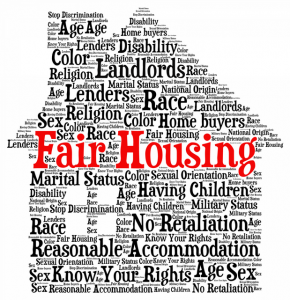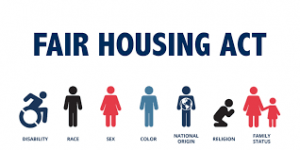What is Fair Housing? Five Things You Should Know
What Is Fair Housing?
Five Things You Should Know
You may be familiar with the term “Fair Housing.” It’s a term you hear most commonly in discussions about rental and for-sale housing, lending, and insurance. So, what is fair housing? In short, Fair housing “is the right to choose housing free from unlawful discrimination.” (fhcwm.org)
The Fair Housing Act was passed in 1968 by Lyndon B. Johnson. The goal was to try to put an end to discrimination in housing that existed during that era. The Fair Housing Act protects people from discrimination when they are renting or buying a home, getting a mortgage, seeking housing assistance, or engaging in other housing-related activities. At first, the act only protected four classes: religion, national origin, race, and color. Sex, disability, and familial status were added later in 1974 and 1988. In recent years, a federal judge ruled that gender identity and sexual orientation be added into these protected classes under the Federal Fair Housing Act in 2017.
Although we have made tremendous progress under the Fair Housing Act, there are still ongoing issues. In 2018, nearly 25,000 discrimination complaints were filed, according to the National Fair Housing Alliance (NFHA). GROWTH wants to ensure everyone interested in owning or renting a home, especially minorities, are aware of the injustices that can occur during the process. So, we’ve listed five important points you should know when it comes to understanding Fair Housing.
Advertise Properly
Although a landlord has the right to choose whomever they want as a tenant for a property, it’s critical that they refrain from discriminating against prospective buyers or tenants. It’s always best to focus on the qualities of the property instead of describing the ideal or tenant in ads. Many landlords may want to consider hiring property management to screen potential tenants. This is also true for the way a for-sale home is advertised. You can’t mention things specific to marriage, children, age, or community demographics, etc. The Federal Housing Administration (FHA) forbids discrimination for all aspects of residential real-estate associated transaction which include:
- making loans to buy, build, repair, or improve a place to live
- selling, brokering or appraising residential real estate
- selling or renting a place to live
Screen Applicants the Right Way
A good landlord will always run a background, criminal history, and credit check on potential tenants. Landlords have the right to ask about prior evictions, bankruptcies, and judgments. But if they ask about anything regarding a tenant having a mental and/or physical disability, marital status, age, or even inquiring about a possible drug or alcohol problem, that raises a problem. Bringing up topics like this is walking a thin line between legal and discriminatory.
Mortgage discrimination is also illegal. This is important to know when you’re applying for a mortgage to buy, refinance, or make improvements to your house. Lenders cannot discriminate based on race, sex, age, or marital status, to name a few. If you’re in the market for a mortgage, it’s important that you research different types of mortgages and available rates and the laws that protect you from discrimination. Check out our blog on redlining here for more information on discrimination in lending.
Be Thorough with Evictions
Each state has laws that describe what a Landlord can evict a renter for. Although evictions may be necessary in certain circumstances, it’s always best to do so as a last resort. If a Landlord must evict a tenant, it’s critical they follow the terms outlined in the lease and state law. And always remember that, evicting someone as a retaliatory act is against the provisions of the Fair Housing Act.
Extenuating Circumstances and ADA requirements
Rules within a lease or purchase agreement should be written in a way that does not discriminate against any specific group of possible tenants or buyers including buyers with disabilities. It is within the landlord’s or seller’s rights to accommodate any tenant or buyer on their terms, but they cannot refuse to accommodate modifications for anyone that may have a mental and/or physical disability protected by the Americans with Disabilities Act (ADA), which is a civil rights law prohibiting discrimination based on disability.
Do Your Research
There are seven classes protected at the Federal level. Many states have enacted laws that extend coverage to more classes of people such as being a member of the military, student status, marital status, occupation, sexual orientation, and even income. It’s important to research which protected classes are covered by the Fair Housing Act at the local and state level.
What is Fair Housing–Conclusion

These 5 points highlight the basic tenets of the Fair Housing Act in situations for
purchasing or leasing a home. Yet, there is no doubt that minorities still face issues when it comes to housing discrimination. At GROWTH we believe it is important to have diversity in homeownership. Neighborhoods with diverse housing types promote racial and economic equity while also creating community stability and vitality. While the Fair Housing Act was a first step in combating redlining and discrimination, the impact of such policies and attitudes persists today. At GROWTH we are dedicated to reversing the impacts of redlining and removing barriers like systemic racism from our and economic inequity from our nation’s housing market. To learn more about our mission visit us here.
Additional Resources:
https://www.hud.gov/program_offices/fair_housing_equal_opp/fair_housing_act_overview
https://fhlaw.org/fair-housing-rights/what-is-fair-housing/
https://ncrc.org/marketplace-lgbtq-people-now-protected-under-the-fair-housing-act/
https://ncrc.org/advocacy-still-necessary-to-ensure-fair-housing-for-all/
Sources:
“Mortgage Discrimination.” Consumer Information, 13 Mar. 2018, www.consumer.ftc.gov/articles/0188-mortgage-discrimination.
TrustHome Properties. “5 Facts About the Federal Fair Housing Act • Laws & Regulations.” TrustHome Properties, 29 Dec. 2018, trusthomeproperties.com/orlando-property-management-blog/federal-fair-housing-act/.
Sievers, About the Author: Stephanie. “5 Things You Need to Know about Fair Housing.” Illinois REALTORS, 9 Apr. 2021, www.illinoisrealtors.org/blog/5-things-you-need-to-know-about-fair-housing/.
